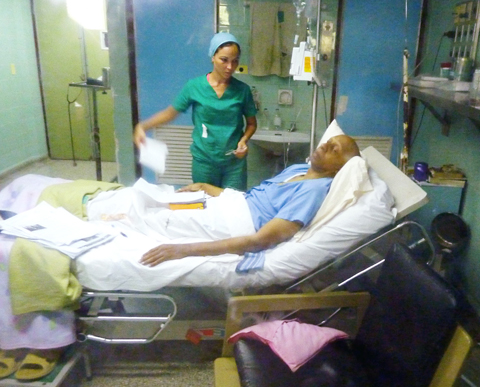A leading Cuban dissident on Thursday ended a 135-day hunger strike after the government said it would free more than 50 political prisoners, raising hopes for improved international ties.
“This confrontation ... has no winners or losers, only Cuba, our nation, has won,” Guillermo Farinas said in a statement presented by his supporters through a hospital window in the city of Santa Clara.

PHOTO: AFP
The frail psychologist has been in intensive care since suffering a hypoglycemic shock two weeks after beginning his protest at the end of February, a day after another dissident, Orlando Zapata, died following an 85-day hunger strike.
Cuba late on Wednesday agreed to free 52 political prisoners in a surprise church-state deal promising the biggest such release since Cuban President Raul Castro formally took power in 2008.
Foreign observers lauded the announcement, with some, including the US and Spain, providing offers of asylum.
US Secretary of State Hillary Rodham Clinton said the step was overdue but “a positive sign,” and many in Europe welcomed the move while calling for the release of all political prisoners.
Farinas had said he would not end his strike until at least five political prisoners were released, having dropped his original demand for 25 to be freed once church mediation was under way.
The first five prisoners, all males aged from 33 to 60, could leave for Spain in the coming days, said the Catholic Church in a statement on Thursday.
Another six were due to be relocated to prisons in their home provinces and those remaining were to be freed within the next three to four months.
The 52 were among 75 dissidents rounded up in 2003 and sentenced to jail terms of six to 28 years.
Talks between Cardinal Jaime Ortega and Castro also involved Spanish Foreign Minister Miguel Angel Moratinos, who said the pending move ushered in “a new era.”
Moratinos said Castro, during their six-hour meeting, had assured him that the exiles and their relatives would be able to return to visit Cuba and that the property of dissidents who leave the country would not be confiscated — measures that would imply a change in Cuban policy.
Cuban’s state-controlled newspapers on Thursday included the announcement of the planned releases, without saying they were political prisoners.
The Church began a dialogue with Havana on May 19. As a result of the talks, one prisoner has been released and another 12 were transferred nearer their families.
US-based Human Rights Watch welcomed the promised releases but warned that more political prisoners could be put in jail.

Auschwitz survivor Eva Schloss, the stepsister of teenage diarist Anne Frank and a tireless educator about the horrors of the Holocaust, has died. She was 96. The Anne Frank Trust UK, of which Schloss was honorary president, said she died on Saturday in London, where she lived. Britain’s King Charles III said he was “privileged and proud” to have known Schloss, who cofounded the charitable trust to help young people challenge prejudice. “The horrors that she endured as a young woman are impossible to comprehend and yet she devoted the rest of her life to overcoming hatred and prejudice, promoting kindness, courage, understanding

Tens of thousands of Filipino Catholics yesterday twirled white cloths and chanted “Viva, viva,” as a centuries-old statue of Jesus Christ was paraded through the streets of Manila in the nation’s biggest annual religious event. The day-long procession began before dawn, with barefoot volunteers pulling the heavy carriage through narrow streets where the devout waited in hopes of touching the icon, believed to hold miraculous powers. Thousands of police were deployed to manage crowds that officials believe could number in the millions by the time the statue reaches its home in central Manila’s Quiapo church around midnight. More than 800 people had sought

DENIAL: Pyongyang said a South Korean drone filmed unspecified areas in a North Korean border town, but Seoul said it did not operate drones on the dates it cited North Korea’s military accused South Korea of flying drones across the border between the nations this week, yesterday warning that the South would face consequences for its “unpardonable hysteria.” Seoul quickly denied the accusation, but the development is likely to further dim prospects for its efforts to restore ties with Pyongyang. North Korean forces used special electronic warfare assets on Sunday to bring down a South Korean drone flying over North Korea’s border town. The drone was equipped with two cameras that filmed unspecified areas, the General Staff of the North Korean People’s Army said in a statement. South Korea infiltrated another drone

Cambodia’s government on Wednesday said that it had arrested and extradited to China a tycoon who has been accused of running a huge online scam operation. The Cambodian Ministry of the Interior said that Prince Holding Group chairman Chen Zhi (陳志) and two other Chinese citizens were arrested and extradited on Tuesday at the request of Chinese authorities. Chen formerly had dual nationality, but his Cambodian citizenship was revoked last month, the ministry said. US prosecutors in October last year brought conspiracy charges against Chen, alleging that he had been the mastermind behind a multinational cyberfraud network, used his other businesses to launder